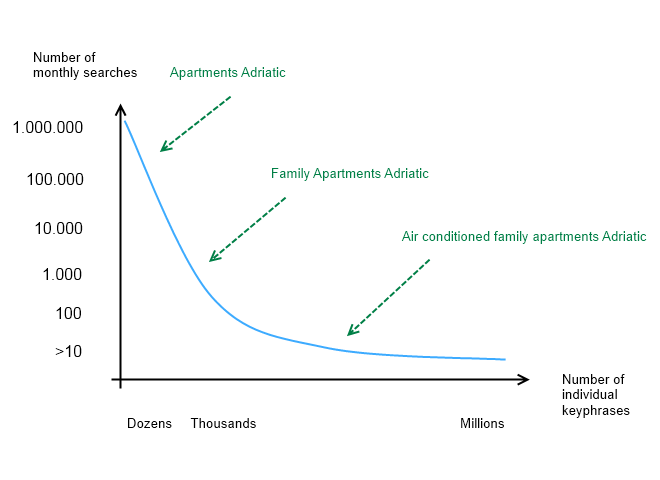Moving your page up in Google search results has become a science of its own. However, that one place makes a great difference in number of people visiting your website, learning of your company and ending up as your customers. So, how to get there? How to optimize a website for search engines?
Search engine optimization is one of the most important things in marketing today, and to master it, you need to invest a lot of time and effort in learning, practicing, analysing, tweaking… However, great results can be achieved by following these few tips.
Plan your keywords
Imagine that you are selling apartment accommodation in the Adriatic. Of course you would want to come up first when someone searches for „apartments adriatic“. But that is the problem – everyone would!

Analyse which keywords you want to optimize for. There are interesting tools that can help you do this, like Google Adwords. As you see in the graph above, the most commonly searched phrases are searched for loads of times. However, a lot of existing companies have already optimized for that. You could go against them there, or you could think about optimizing for less searched keyword phrases, e.g. “apartments in the adriatic with beach and air conditioning”. Now this is a phrase that is going to be searched for much less often. But this gives you two reasons why you would want to optimize for this and phrases like this one:
- Less often searched key phrase means less competition
- There are a lot of “less often searched key phrases”, if each one brings in a little traffic and you optimize for a lot of them…
There are tools that can help you analyze what keywords are searched for how many times, how great the competition there is, how hard it is to progress there…
Write for humans, not for search engines
OK, so, now you have your key phrase you are optimizing for, and now you just put it in 20 different places on the page, add a few sentences in between just so it looks nice from a glance (Lorem ipsum, anyone?) and there you have it.
Wrong!
Write for humans. It is important that, when you actually get a person to visit your website, you give them quality content. You want them to remember you as a relevant source according to this content and to come back when they need more info, you want them to share your content on social networks…
So, always write your content first with your readers in mind, and then just tweak it a little to get better search engine ranking.
Important tips
Too little is too little, too much can get you penalized. What you always want is to have your key phrase inside your page title and inside the first H1 element on your page. And then you want to have a few occurrences of it in the text, not too many because you can get penalised for it.
You want to have ALT tags defined for your images, as well as TITLE tags. This is something also considered by search engine crawlers.
You want each of your pages to have a meta description tag. These are important for search engines, but should look humanly friendly. Try to squeeze your key phrase in there, but remember, people will see this text in search engine search results. For example, in Google search results Google returns the page title (big blue letters), then page URL (green letters) and below that the page meta description (if defined), or just some random text. So, knowing this you can really think how to use the meta description tag to your advantage.
The magic circle: tweak, measure, analyse
Optimizing for search engine is a long term process where you need to show patience and discipline. Optimize a page for a certain keyword. Give it a few weeks to see the results. However, you must use a tool to analyse these results (e.g. Google Analytics). And you must take the time to analyse this. Then change something, again give it a few weeks, again analyse and make comparisons. This is the only way to see whether you are doing well and whether you are moving forward.
Good news: with experience the number of iterations decreases. But the magic circle still remains.

Build links
In order to optimize a website for search engines, links are very important. Both inbound links (i.e. links from other sites pointing to your website) as well as internal links (linking from one of your pages to another). You can do small things with both of these that make a big difference in what your clients are going to experience, and how the search engine crawlers are going to rate your site.
When you link to your own page from your own website, make it an interesting link. I.e. do not say “Click here if you want to learn more about reservation management”. Say “To make progress in your business learn why reservation management is important”.
Use social networks to share your content. This will allow your content to reach more people, and it will get more people to come and read what you have to say and offer. Include Share buttons in your pages, make it easy for your readers to share content.
Get inbound links. If people are linking to your page, then search engines get the impression that it gives relevant content, and boost its page rank. However, this is also an area where you can get penalized. So, there are good and bad ways of getting links.
A good way is, for example, to register your company to tourist board directories, business directories and other. Also, if you attend some trade shows or expos, be sure to get mentioned on their websites with a link back. A bad way of getting a link is if you get a link from a known link farm (yes, people make pages that have no meaning, just links to other pages in the idea to boost page ranks!), if you get a “white text on white background” link and a million others. These will drop your ranking considerably.
However, the best way of building links is through long and successful mutual cooperation. If you are working with someone and they are pleased with your work, they will do their best to promote your company by linking to it on their own.
Offer quality content
This is the most important one. All those tips above might help get people to your site. However, what you need is to make those people stay on your site and convert them to leads and later to customers.
If I come to your website through a search engine, and see that what I got was not what I was looking for, but just some dummy content generated to “confuse” the search engines, I am out of there. And, due to the enormous competition in the tourism business, am most probably never coming back.
However, if your site provides me with useful information and great offers, I shall remember you and come to you next time when I need something similar.
This is what website optimization is about, not just getting the people to come to your site, but to make them stay and come back over and over again. If you want to optimize a website for search engines, you will, of course, need to go into the search engine optimization much deeper than this article. But your goal should be to make a website that delivers quality and relevant content that the users keep coming back to. If you can make a website that does this, you can just sit back and wait and monitor how it climbs in Google rankings.


